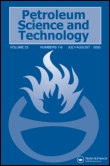
PETROLEUM SCIENCE AND TECHNOLOGY
Scope & Guideline
Contributing to the evolution of petroleum science and technology.
Introduction
Aims and Scopes
- Enhanced Oil Recovery (EOR) Techniques:
Research on innovative methods for improving oil recovery from reservoirs, including the use of surfactants, polymers, and nanotechnology to optimize the extraction process. - Reservoir Characterization and Modeling:
Studies focused on the geological and petrophysical characterization of reservoirs, employing numerical modeling and experimental techniques to understand fluid flow and reservoir dynamics. - Sustainable Practices and Environmental Impact:
Exploration of eco-friendly technologies and practices in petroleum extraction, including wastewater treatment, emissions reduction, and the use of biodegradable materials. - Chemical Engineering Applications:
Application of chemical engineering principles in the development of new materials and processes for oil extraction, refining, and processing, including catalyst development and reaction engineering. - Machine Learning and Data Analysis:
Utilization of artificial intelligence and machine learning techniques for predictive modeling, data analysis, and optimization in petroleum engineering. - Fluid Mechanics and Rheology:
Investigations into the properties and behaviors of fluids in various processes related to oil recovery, including the study of emulsions, foams, and flow dynamics. - Geochemical and Petrophysical Studies:
Research on the chemical composition and physical properties of hydrocarbons and their source rocks, focusing on the geochemical processes that affect oil and gas reservoirs.
Trending and Emerging
- Advanced Numerical Simulation Techniques:
There is a growing trend towards utilizing sophisticated numerical methods and simulations to predict reservoir behavior, optimize extraction techniques, and analyze fluid dynamics. - Nanotechnology in Oil Recovery:
The use of nanomaterials in enhancing oil recovery processes is emerging as a significant area of research, focusing on their effects on fluid properties and recovery efficiency. - Environmental Sustainability and Remediation:
Research on sustainable practices and remediation technologies for oil spills and wastewater treatment is gaining prominence, reflecting an industry-wide shift towards environmental responsibility. - Integration of AI and Big Data:
The integration of artificial intelligence and big data analytics in petroleum engineering is on the rise, with applications in predictive maintenance, reservoir characterization, and production optimization. - Multiphase Flow and Complex Fluid Behaviors:
There is an increasing emphasis on studying multiphase flow behaviors in reservoirs, reflecting the need for more comprehensive models that account for the complexities of real-world fluid interactions. - Carbon Capture and Storage Technologies:
Research focusing on carbon capture, utilization, and storage (CCUS) technologies is gaining traction, driven by the need to mitigate greenhouse gas emissions from hydrocarbon extraction and utilization.
Declining or Waning
- Traditional Drilling Techniques:
Research focusing on conventional drilling methods has decreased, as the industry shifts towards more innovative and efficient technologies such as horizontal drilling and automated drilling systems. - Basic Reservoir Engineering Principles:
Publications that cover fundamental concepts of reservoir engineering have become less common, as the journal emphasizes more advanced and integrated approaches to reservoir management. - Hydrocarbon Exploration in Established Basins:
Interest in exploration studies in well-established basins is waning, as the focus shifts to unconventional resources and emerging basins with untapped potential. - Single-Phase Flow Studies:
Research dedicated solely to single-phase flow dynamics is less prevalent, as studies increasingly incorporate multi-phase flow scenarios that reflect real-world conditions. - Static Reservoir Modeling:
The emphasis on static modeling approaches has diminished in favor of dynamic modeling techniques that better capture the complexities of reservoir behavior over time.
Similar Journals

JOURNAL OF SURFACTANTS AND DETERGENTS
Advancing the Chemistry of Surfaces and InterfacesJournal of Surfactants and Detergents, published by Wiley, is a prominent peer-reviewed journal dedicated to advancing scientific knowledge in the field of surfactants, detergents, and their applications. With an ISSN of 1097-3958 and an E-ISSN of 1558-9293, this journal serves as an essential resource for researchers, industry professionals, and students specializing in Chemical Engineering, Physical and Theoretical Chemistry, and Materials Science. Since its inception in 1998, the journal has fostered innovative research and multidisciplinary collaboration, reflected in its current Q3 ranking in several Scopus categories. Although it operates under a traditional publishing model, the journal's robust research contributions continue to engage a wide audience eager to explore the latest developments in surfactant and detergent science. As a key player in the field, the journal not only publishes cutting-edge research but also facilitates dialogue and knowledge exchange, making it an invaluable asset for anyone invested in the chemistry of surfaces and interfaces.
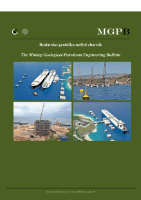
Rudarsko-Geolosko-Naftni Zbornik
Illuminating Paths in Mining, Geology, and PetroleumRudarsko-Geolosko-Naftni Zbornik, the esteemed journal published by the University of Zagreb's Faculty of Mining, Geology and Petroleum Engineering, serves as a vital platform for advancing knowledge in the fields of Earth sciences, energy, and geology. With an ISSN of 0353-4529 and an E-ISSN of 1849-0409, this open-access journal has been disseminating high-quality research since 1989, contributing significantly to scientific discourse in Croatia and beyond. As of 2023, it holds an impressive categorization in various quartiles, notably achieving Q2 in Earth and Planetary Sciences and Q3 in several related domains, showcasing its relevance and impact within the academic community. The journal's commitment to quality is reflected in its Scopus rankings, placing it in competitive positions across diverse disciplines. Researchers, professionals, and students alike will find invaluable resources and insights that foster innovation and collaboration in their respective fields, making Rudarsko-Geolosko-Naftni Zbornik an essential read for those dedicated to exploring the complexities of natural resources and environmental challenges.
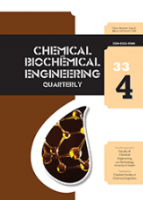
CHEMICAL AND BIOCHEMICAL ENGINEERING QUARTERLY
Bridging Academia and Industry in Chemical InnovationsCHEMICAL AND BIOCHEMICAL ENGINEERING QUARTERLY, published by the Croatian Society of Chemical Engineering Technology, is a distinguished open-access journal that has been providing a platform for the dissemination of innovative research since its inception in 1987. With a focus on the fields of biochemistry and chemical engineering, this quarterly journal addresses a wide array of topics, including process chemistry and technology, making significant contributions to both academia and industry. Despite its current positioning in the Q4 category for biochemistry and Q3 for miscellaneous chemistry and process chemistry in 2023, the journal continues to strive for greater impact, catering to researchers, professionals, and students alike. Its open-access model, in place since 2001, ensures that cutting-edge research is accessible to a broad audience, fostering collaboration and knowledge sharing within the scientific community. By promoting high-quality research and providing insights into the latest advancements, Chemical and Biochemical Engineering Quarterly remains an essential resource for those involved in the chemical and biochemical engineering disciplines.
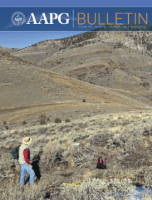
AAPG BULLETIN
Advancing Earth Sciences and Energy Engineering.AAPG BULLETIN, published by the American Association of Petroleum Geologists, stands as a premier journal in the fields of Earth Sciences and Energy Engineering. With an impressive history spanning from 1968 to 2023, the journal has established itself as a valuable resource for researchers and professionals alike, focusing on a wide array of topics including geology, geochemistry, petrology, and fuel technology. Its robust standing in the academic community is reflected in its recognition as a Q1 journal across multiple categories such as Earth and Planetary Sciences, Energy Engineering, and Geology, with notable rankings in prestigious databases like Scopus. Although not an open-access journal, the AAPG BULLETIN provides vital insights and studies that advance our understanding of Earth processes and energy resources. It serves as an essential platform for disseminating cutting-edge research, fostering collaboration, and inspiring the next generation of scientists and engineers in the pursuit of sustainable energy solutions.
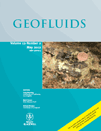
GEOFLUIDS
Exploring the Interplay of Fluids and GeologyGEOFLUIDS, published by WILEY-HINDAWI, is an esteemed open-access journal dedicated to advancing the field of Earth and Planetary Sciences since its inception in 2001. With an ISSN of 1468-8115 and E-ISSN 1468-8123, the journal has become increasingly accessible, allowing for broader dissemination of research findings since adopting an open-access model in 2017. The journal has established itself within the academic community, achieving a Scopus rank of #86 in the domain of General Earth and Planetary Sciences, placing it in the 56th percentile, and garnering a Q3 category classification as of 2023. GEOFLUIDS serves as a platform for interdisciplinary exchange of ideas and findings—encouraging contributions that explore fluid dynamics in geological systems and their implications for natural resources and environmental management. Researchers, professionals, and students alike are invited to contribute to and engage with the latest research in this growing field, further enhancing the journal's role in shaping the future of Earth science research.

Nafta-Gaz
Empowering Professionals with Cutting-edge Energy InsightsNafta-Gaz is a leading academic journal published by the Institute of Oil and Gas, dedicated to advancing the fields of energy engineering, environmental engineering, fuel technology, and geosciences. With a strong emphasis on both theoretical and applied research, this journal serves as a critical resource for professionals, researchers, and students looking to deepen their understanding of contemporary challenges in oil, gas, and renewable energy sectors. Though currently categorized in the Q4 quartile across several relevant disciplines, including Energy Engineering and Geophysics, Nafta-Gaz is committed to fostering innovative discussions and pragmatic solutions that pertain to energy management, environmental policy, and technological advancements. Published in Poland, Nafta-Gaz is positioned amid the rapidly evolving energy landscape, providing a platform for the exchange of knowledge and best practices. The journal does not currently operate under an open access model, ensuring that content is curated for a specialized audience while maintaining the integrity of scholarly communication.
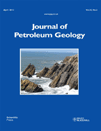
JOURNAL OF PETROLEUM GEOLOGY
Charting New Frontiers in Petroleum GeologyJOURNAL OF PETROLEUM GEOLOGY, published by WILEY, is a prestigious peer-reviewed journal that serves as a vital platform for advancing knowledge in the fields of Earth and Planetary Sciences, Energy Engineering, and Geology. Established in 1978, this journal has cultivated a significant impact, reflected in its 2023 Q2 category rankings across multiple disciplines including Fuel Technology and Geology. Notably, it holds a commendable position in Scopus rankings, marking its importance with a 68th percentile in Earth and Planetary Sciences - Geology. While the journal operates under a traditional subscription model, its extensive repository of research articles facilitates crucial discussions and innovations among researchers, professionals, and students alike. The JOURNAL OF PETROLEUM GEOLOGY is pivotal for those seeking to explore and contribute to the evolving landscape of petroleum geology, offering insights that are essential for both academic and applied science domains.
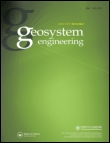
Geosystem Engineering
Transforming challenges into sustainable practices.Geosystem Engineering, published by Taylor & Francis Ltd, is a prominent academic journal focusing on the interdisciplinary fields of Environmental Engineering, Pollution, and Waste Management and Disposal. With an ISSN of 1226-9328 and an E-ISSN of 2166-3394, this journal has been a significant contributor to the scholarly discussions since its inception in 1998 and continues to publish impactful research up to 2024. As a recognized journal within the Q3 category for its respective fields as of 2023, it serves as a vital platform for researchers, professionals, and students aiming to disseminate findings, share innovations, and address pressing environmental challenges. Although it does not currently offer Open Access options, Geosystem Engineering remains essential for those invested in advancing sustainable practices and technologies in geosystems. The journal delivers critical insights that contribute to the development of policies and practices aimed at improving environmental quality and waste management strategies globally.

SPE RESERVOIR EVALUATION & ENGINEERING
Empowering Energy Professionals with Cutting-Edge ResearchSPE RESERVOIR EVALUATION & ENGINEERING, published by the Society of Petroleum Engineers, is a leading academic journal that plays a pivotal role in the fields of energy engineering and geology. With a notable Q2 ranking in Energy Engineering, Fuel Technology, and Energy (Miscellaneous), as well as a Q1 ranking in Geology, this journal is recognized for its high-quality, peer-reviewed research contributions that enhance our understanding of reservoir evaluation and engineering practices. Since its inception in 1999, the journal has aimed to disseminate innovative techniques and methodologies applicable to both academia and industry. Available in both print (ISSN: 1094-6470) and online (E-ISSN: 1930-0212) formats, it ensures wide accessibility to its content even as it embraces Open Access options for select titles. Researchers, professionals, and students alike can benefit from the rich repository of technical papers, case studies, and reviews, all designed to advance knowledge and applications in the ever-evolving energy sector.
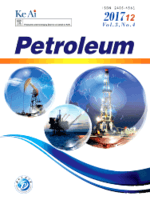
Petroleum
Exploring the depths of energy innovation and geological insights.Petroleum, an esteemed open-access journal published by KEAI PUBLISHING LTD, serves as a premier platform for disseminating high-quality research in the fields of energy engineering, fuel technology, geology, and related earth sciences. Established in 2015, the journal exemplifies innovation and scholarly rigor with a commendable ranking in the second quartile across multiple categories, including Energy Engineering and Geopolitics. With a focus on advancing knowledge and practices in the petroleum sector, it encourages submissions that encompass a broad spectrum of topics from exploration and extraction techniques to environmental impacts and sustainability measures. Based in Beijing, China, this journal's impact is further enhanced by its significant presence in the Scopus database, achieving impressive percentiles, such as the 95th for Geology and 93rd for Geochemistry and Petrology. The open-access model fosters unrestricted global collaboration and accessibility, making the latest research available to a diverse audience of researchers, professionals, and students eager to innovate and lead in the burgeoning energy landscape.